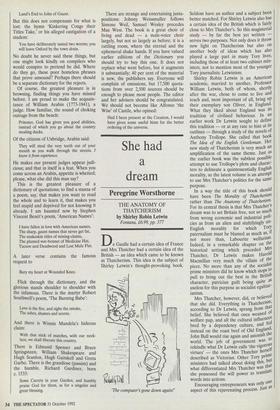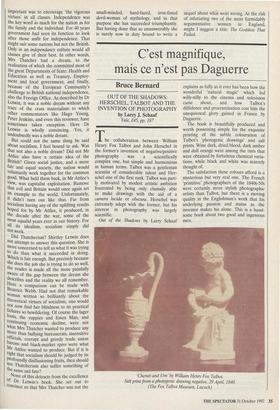She had a dream
Peregrine Worsthorne
THE ANATOMY OF THATCHERISM by Shirley Robin Letwin Fontana, f6.99, pp. 377 De Gaulle had a certain idea of France and Mrs Thatcher had a certain idea of the British — an idea which came to be known as Thatcherism. This idea is the subject of Shirley Letwin's thought-provoking book.
`The computer's gone down again!'
Seldom have an author and a subject been better matched. For Shirley Letwin also has a certain idea of the British which is fairly close to Mrs Thatcher's. So this magisterial study — by far the best yet written serves two purposes. Not only does it throw new light on Thatcherism but also on another body of ideas which has also played a large part in many Tory lives, including those of at least two cabinet min- isters, not to mention most of the younger Tory journalists: Letwinism. Shirley Robin Letwin is an American academic, married to another, Professor William Letwin, both of whom, shortly after the war, chose to come to live and teach and, most important of all, bring up their exemplary son Oliver, in England. What they liked about England was its tradition of civilised behaviour. In an earlier work Dr Letwin sought to define this tradition — or at any rate to hint at its outlines — through a study of the novels of Anthony Trollope. She called that book The Idea of the English Gentleman. Her new study of Thatcherism is very much an amplification of the same theme. Just as the earlier book was the subtlest possible attempt to use Trollope's plots and charac- ters to delineate a quintessentially English morality, so the latest volume is an attempt to use Mrs Thatcher's politics for the same purpose. In a way the title of this book should have been The Morality of Thatcherism rather than The Anatomy of Thatcherism. For its central thesis is that Mrs Thatcher's dream was to set Britain free, not so much from wrong economic and industrial poli- cies as from an alien and stultifyingly on" English morality for which Tory paternalism must be blamed as much as, if not more than, Labourite welfaristn. Indeed, in a remarkable chapter on the historical setting which preceded Mrs Thatcher, Dr Letwin makes Harold Macmillan very much the villain of the piece. No more than any of the socialist prime ministers did he know which stops to pull to bring out the best in the British character, patrician guilt being quite as useless for this purpose as socialist egalitar- ianism. Mrs Thatcher, however, did, or believed that she did. Everything in Thatcherism, according to Dr Letwin, sprang from that belief. She believed that once weaned of welfare pap, and all the cultural influences bred by a dependency culture, and fed instead on the roast beef of Old England' John Bull would rise again and astonish the world. The job of government was to rekindle what Dr Letwin calls 'the vigorous_ virtues' — the ones Mrs Thatcher herself described as Victorian. Other Tory Prime
.
ministers had talked about doing this, 1/01. what differentiated Mrs Thatcher was that
she erpoisnsteo actions.
will power to translate words Encouraging entrepreneurs was only one aspect of this rejuvenating process. Just as important was to encourage 'the vigorous virtues' in all classes. Independence was the key word as much for the nation as for the family and the individual. For 40 years government had seen its function to look after those unfit for independence. That might suit some nations but not the British. Only in an independancy culture would all classes give of their best. In other words, Mrs Thatcher had a dream, to the realisation of which she committed most of the great Departments of State: Health and Education as well as Treasury, Employ- ment and local government, and finally, because of the European Community's challenge to British national independence, also the Foreign Office. As described by Dr Letwin, it was a noble dream without any trace of the crass materialism to which other commentators like Hugo Young, Peter Jenkins, and even this reviewer, have sometimes taken exception. Here Dr Letwin is wholly convincing. Yes, it undoubtedly was a noble dream. But could not the same thing be said about socialism, I feel bound to ask. Was that not also a noble dream? Did not Mr Attlee also have a certain idea of the British? Given social justice, and a more fair and equal society, the nation would voluntarily work together for the common good. What held them back, in Mr Attlee's view, was capitalist exploitation. Remove that evil and Britain would once again set an example to the world. Unfortunately, it didn't turn out like that. Far from socialism having any of the uplifting results hoped for by Mr Attlee, it produced, in the decade after the war, some of the most squalid years ever in our history. For all its idealism, socialism simply did not work.
Did Thatcherism? Shirtley Letwin does not attempt to answer this question. She is more concerned to tell us what it was trying to do than what it succeeded in doing. Which is fair enough. But precisely because she does the job she is trying to do so well, the reader is made all the more painfully aware of the gap between the dream she describes and the reality we all remember. Here a comparison can be made with Beatrice Webb. Had not that remarkable woman written so brilliantly about the theoretical virtues of socialism, one would not now find her blindness to its practical failures so bewildering. Of course the lager louts, the yuppies and Essex Man, and continuing economic decline, were not what Mrs Thatcher wanted to produce any more than bullying bureaucrats, insensitive officials, corrupt and greedy trade union barons and black-market spivs were what Mr Attlee wanted to produce. But if it is right that socialism should be judged by its profoundly disillusioning fruits, then should not Thatcherism also suffer something of the same sad fate? None of this detracts from the excellence of Dr Letwin's book. She set out to convince us that Mrs Thatcher was not the small-minded, hard-faced, iron-fisted devil-woman of mythology, and in that purpose she has succeeded triumphantly. But having done that so unanswerably she is surely now in duty bound to write a sequel about what went wrong. At the risk of infuriating two of the most formidably argumentative women in England, might I suggest a title: The Goddess That Failed.



























































 Previous page
Previous page